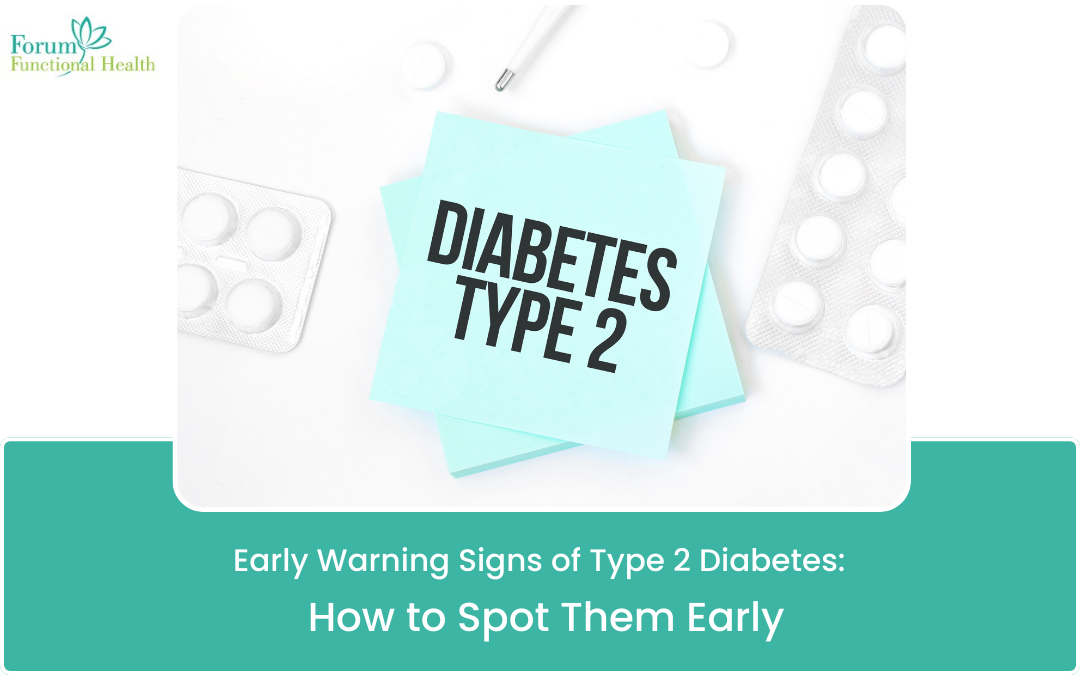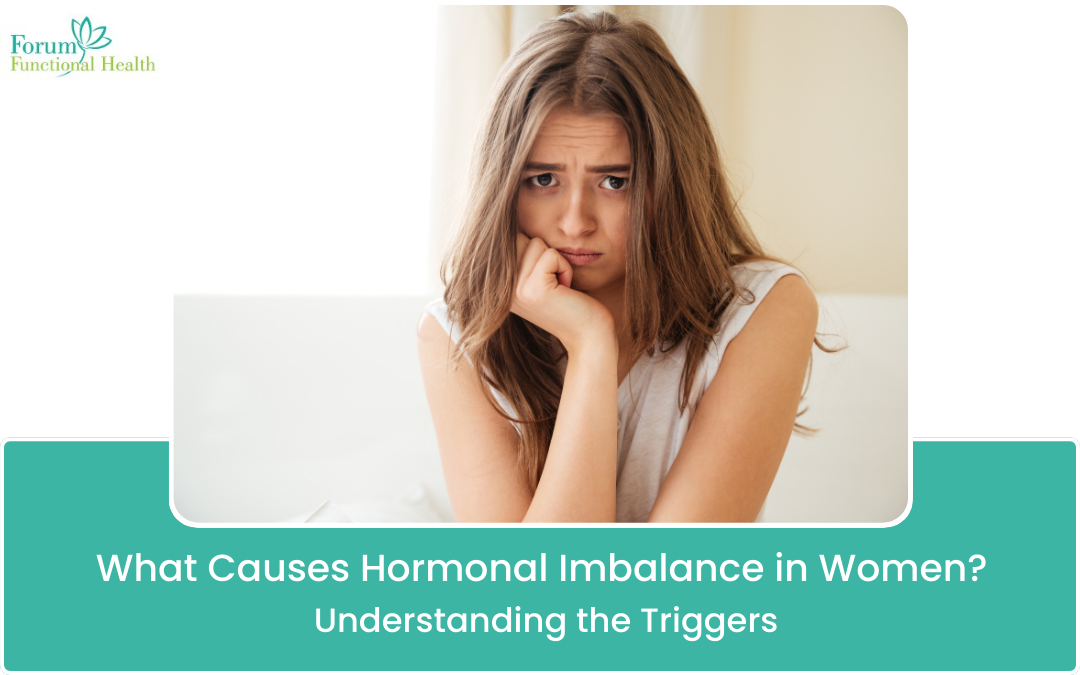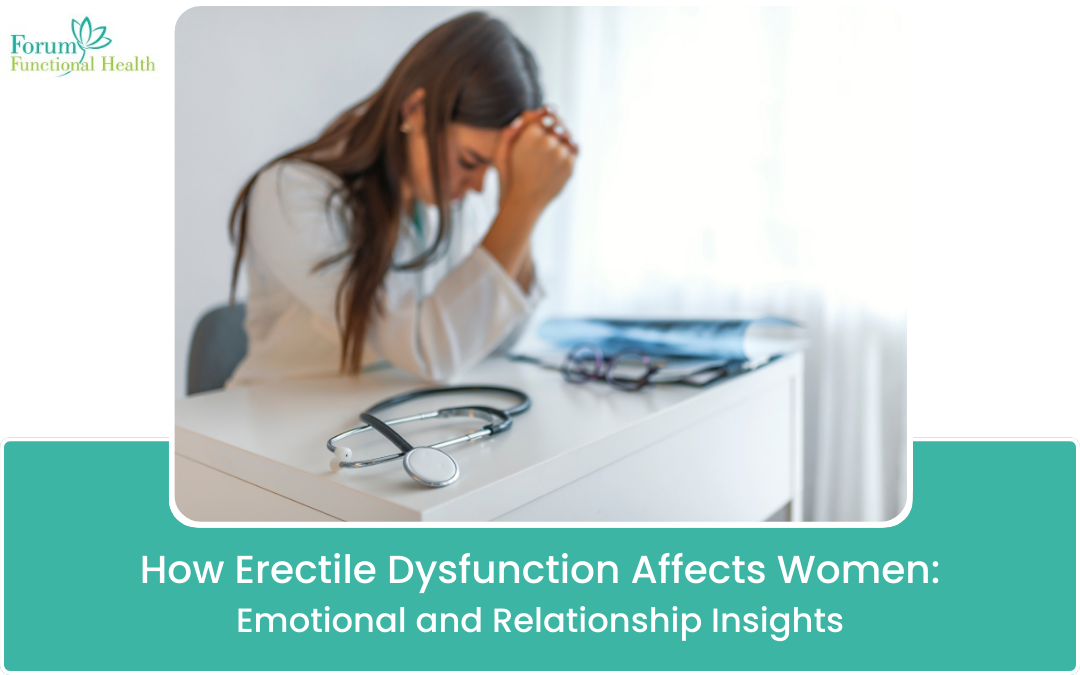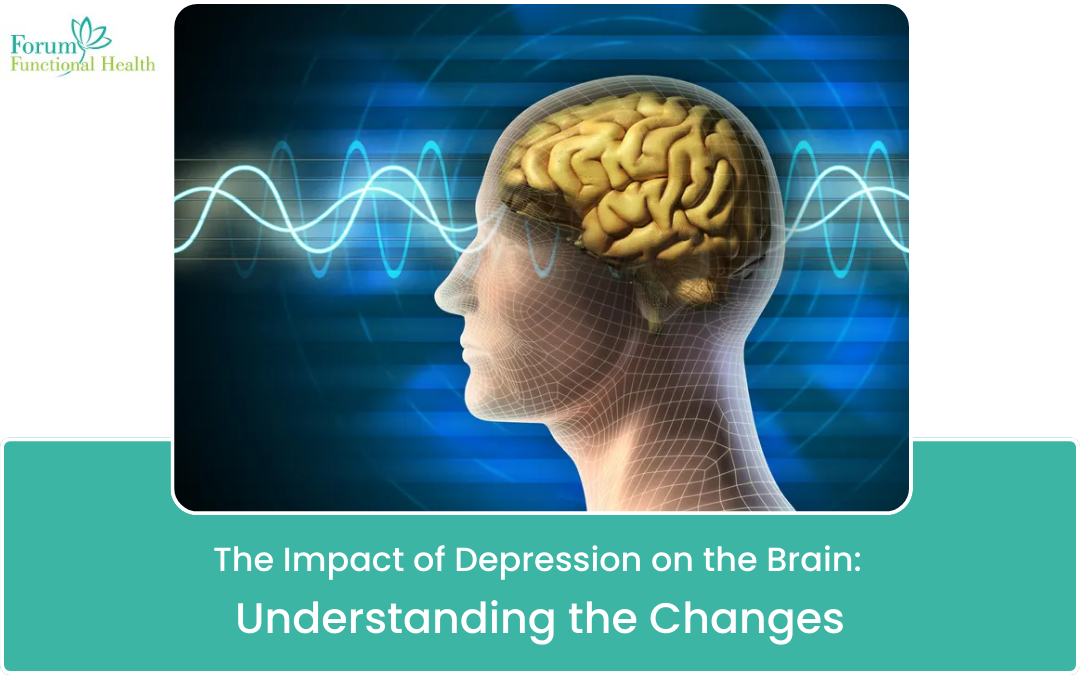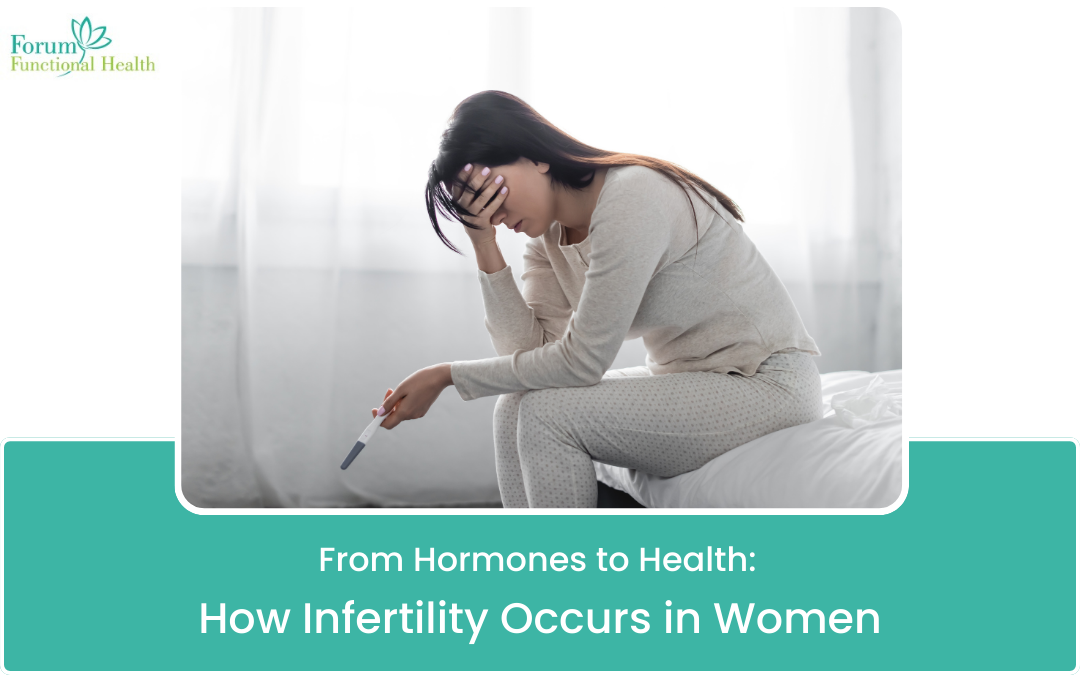
by Forum Functional Health Center | Aug 16, 2024 | Diabetes Management
Type 2 diabetes is a growing concern in today’s fast-paced world, affecting millions of people globally. Early detection is crucial for managing this condition effectively and preventing severe complications. Recognizing the warning signs can make a significant difference in your health and well-being. If you’re concerned about your risk, it’s essential to understand these early symptoms and seek professional care from a trusted provider like the Forum Functional Health Center.
Understanding the Risk: What is Type 2 Diabetes?
Type 2 diabetes is a chronic condition that affects how your body processes blood sugar (glucose). Unlike Type 1 diabetes, where the body does not produce insulin, in Type 2, your body either resists the effects of insulin or doesn’t produce enough to maintain normal glucose levels. This can lead to serious health issues if left unchecked.
Key Point: Early intervention can slow the progression of Type 2 diabetes, making it essential to identify symptoms as soon as they arise.
Subtle Yet Significant: Early Warning Signs of Type 2 Diabetes
Recognizing the early signs of Type 2 diabetes can be challenging because they often develop slowly. However, being aware of these symptoms can lead to a timely diagnosis and better management of the condition.
1. Increased Thirst and Frequent Urination
One of the most common early signs of Type 2 diabetes is increased thirst and frequent urination. As your body struggles to manage glucose levels, it pulls fluid from your tissues, making you feel dehydrated. This triggers an urge to drink more water, which in turn leads to frequent urination. If you notice you’re visiting the restroom more than usual, it could be time to consult a healthcare professional at a Functional Health Center in Texas.
2. Unexplained Weight Loss
While weight loss is often a positive goal, sudden and unexplained weight loss can be a sign of underlying health issues, including Type 2 diabetes. As your body cannot efficiently use glucose for energy, it begins to burn fat and muscle, leading to weight loss. If you’re losing weight without trying, consider getting your blood sugar levels checked at a center specializing in Weight Loss Management in Texas.
3. Fatigue and Weakness
Feeling unusually tired or weak? Fatigue is another early warning sign of Type 2 diabetes. When your body is unable to process glucose properly, you may feel constantly drained. This can interfere with your daily activities, making it difficult to stay active and engaged in life.
4. Blurred Vision
High blood sugar levels can lead to swelling in the lens of your eyes, causing blurred vision. This is often one of the first signs people notice, but it’s easy to dismiss as a temporary issue. If your vision changes persist, it’s crucial to seek professional care, as untreated diabetes can lead to severe eye complications.
5. Slow-Healing Sores or Frequent Infections
Another common symptom is the slow healing of cuts and sores. High glucose levels can impair circulation and slow down the healing process. Additionally, you may experience frequent infections, particularly skin and urinary tract infections, due to compromised immune function.
Why Early Detection Matters: Protect Your Health
Early detection and management of Type 2 diabetes are vital in preventing long-term complications such as heart disease, nerve damage, and kidney failure. With the right care plan, including lifestyle changes and medication, you can live a healthy, fulfilling life despite the diagnosis.
Take Control of Your Health: Visit a Functional Health Center in Texas
If you recognize any of these symptoms, it’s important not to ignore them. Early intervention is key to managing Type 2 diabetes effectively. By visiting a Functional Health Center in Texas, you can receive a comprehensive evaluation and a personalized treatment plan designed to address your specific needs.
Effective Management: Explore Type 2 Diabetes Treatment in Texas
Managing Type 2 diabetes involves a combination of medication, lifestyle changes, and regular monitoring of blood sugar levels. The good news is that with the right support, many people can manage their condition effectively and lead healthy lives. If you’re looking for specialized care, consider the comprehensive services available at Type 2 Diabetes Treatment in Texas.
Conclusion: Don’t Wait to Act
Type 2 diabetes is a serious condition, but with early detection and proper management, it can be controlled. Stay vigilant about your health and pay attention to the warning signs. If you’re experiencing any of these symptoms, reach out to a healthcare provider at the Forum Functional Health Center. Early action could be the key to maintaining your health and well-being for years to come.
Read More:- Can Thyroid Disease Lead to High Cholesterol? Understanding the Connection

by Forum Functional Health Center | Aug 13, 2024 | Thyroid disease
The thyroid gland plays a crucial role in your body’s overall health, affecting everything from energy levels to metabolism. But did you know that thyroid disease can also lead to high cholesterol? Understanding the connection between these two conditions is vital for managing your health effectively. If you’re dealing with thyroid issues, it’s essential to explore how this might impact your cholesterol levels and what steps you can take to address it. The Forum Functional Health Center offers comprehensive care to help you navigate this complex relationship.
How Thyroid Disease Affects Cholesterol Levels
Your thyroid gland produces hormones that regulate your metabolism, including how your body processes fats and cholesterol. When your thyroid isn’t functioning properly, it can throw your cholesterol levels out of balance, leading to elevated levels that increase your risk for heart disease.
Key Point: Thyroid dysfunction, particularly hypothyroidism, can lead to an increase in LDL (bad) cholesterol and triglycerides, making it essential to monitor your thyroid health.
Understanding the Types of Thyroid Disease
Thyroid disease generally falls into two categories: hypothyroidism (underactive thyroid) and hyperthyroidism (overactive thyroid). Both conditions can impact cholesterol levels, but they do so in different ways.
1. Hypothyroidism and High Cholesterol
Hypothyroidism occurs when the thyroid gland doesn’t produce enough hormones. This slowdown in hormone production can lead to a decrease in metabolism, causing cholesterol to accumulate in the bloodstream. As a result, people with hypothyroidism often experience elevated LDL cholesterol levels, which can be challenging to control without proper treatment. If you suspect you might have hypothyroidism, consider seeking professional care at a Functional Health Center in Texas.
2. Hyperthyroidism and Cholesterol
On the other hand, hyperthyroidism, where the thyroid is overactive, can sometimes lead to lower levels of cholesterol. However, this condition is also associated with other health risks, including heart palpitations and muscle weakness. Proper management is crucial, and if you’re dealing with hyperthyroidism, specialized care such as Thyroid disease Treatment in McKinney can help you maintain balanced cholesterol levels.
The Connection Between Thyroid Disease and Cholesterol
The relationship between thyroid disease and cholesterol is complex. When your thyroid isn’t functioning correctly, it disrupts the liver’s ability to process and remove LDL cholesterol from your bloodstream. This leads to higher levels of LDL cholesterol, which can accumulate in your arteries, increasing the risk of heart disease.
Fact: Even mild thyroid dysfunction can impact cholesterol levels, making regular monitoring and early intervention key to preventing complications.
Symptoms to Watch For: Thyroid Disease and High Cholesterol
If you’re experiencing symptoms of thyroid disease, it’s essential to be aware of how these symptoms might also indicate high cholesterol. Common signs include:
- Fatigue: Low energy levels are common in both hypothyroidism and high cholesterol.
- Weight Gain: An underactive thyroid slows metabolism, leading to weight gain and potential increases in cholesterol levels.
- Cold Sensitivity: Feeling unusually cold can be a sign of hypothyroidism, which might be linked to elevated cholesterol.
- Dry Skin and Hair: These symptoms can indicate thyroid dysfunction, which in turn may affect cholesterol levels.
If you notice any of these symptoms, it’s important to consult with a healthcare professional to evaluate your thyroid function and cholesterol levels. A visit to a Functional Health Center in Texas can provide you with the necessary tests and personalized care.
Managing Cholesterol Levels with Thyroid Disease
If you’ve been diagnosed with thyroid disease and are struggling with high cholesterol, there are several steps you can take to manage your condition effectively:
1. Medication
For those with hypothyroidism, thyroid hormone replacement therapy can help restore normal thyroid function, which may also help bring your cholesterol levels under control.
2. Diet and Exercise
A healthy diet and regular physical activity are crucial in managing both thyroid disease and high cholesterol. Focus on foods rich in omega-3 fatty acids, fiber, and antioxidants to support heart health and thyroid function.
3. Regular Monitoring
Regular check-ups are essential to monitor both thyroid function and cholesterol levels. Consistent monitoring allows for timely adjustments in treatment plans, ensuring that both conditions are managed effectively.
Seeking Professional Help: Thyroid Disease Treatment in McKinney
Managing thyroid disease and high cholesterol can be challenging, but with the right support, it’s possible to lead a healthy life. The Thyroid Disease Treatment in McKinney offers personalized care that addresses both your thyroid health and cholesterol levels, helping you maintain balance and prevent complications.
Conclusion: Take Charge of Your Health
Understanding the connection between thyroid disease and high cholesterol is essential for managing your overall health. By staying informed and proactive, you can reduce your risk of heart disease and other complications. If you suspect you have thyroid issues, or if you’re struggling with high cholesterol, don’t hesitate to seek help. The Contact Forum Functional Health Center provides comprehensive care tailored to your needs, ensuring you receive the best possible treatment.
Read More:- What Are the Symptoms of Thyroid Issues During Pregnancy

by Forum Functional Health Center | Aug 12, 2024 | Weight Management
In today’s fast-paced world, weight loss management has become more crucial than ever. It’s not just about fitting into a smaller size or achieving a specific look; it’s about maintaining your overall health and well-being for the long haul. This journey requires commitment and the right support, and that’s where centers like the Forum Functional Health Center come in. If you’re looking for sustainable ways to manage your weight, understanding its importance for long-term health is the first step.
Understanding the Connection Between Weight and Health
Maintaining a healthy weight is about more than just looking good—it’s about feeling good, too. Excess weight can lead to a range of health problems, including heart disease, diabetes, and joint issues. The strain that extra weight puts on your body can affect your quality of life, making everyday activities more difficult. At the Functional Health Center in Texas, experts focus on a holistic approach to weight management, addressing not just the physical aspects but also the emotional and psychological factors involved.
The Role of Hormonal Balance in Weight Management
Hormones play a vital role in your body’s ability to manage weight. An imbalance can lead to unexplained weight gain, especially around the abdomen, and can make losing weight feel like an impossible task. This is where Hormonal Imbalance Treatment in Texas can make a difference. By identifying and addressing hormonal issues, you can find it easier to manage your weight and achieve long-term health goals.
Preventing Chronic Diseases Through Weight Management
One of the most significant benefits of weight loss management is the prevention of chronic diseases. Conditions like type 2 diabetes, high blood pressure, and cardiovascular diseases are closely linked to being overweight. By managing your weight effectively, you reduce the risk of developing these conditions, leading to a longer, healthier life. The Weight Loss Management in Texas programs are designed to help you understand your body and the impact of weight on your health, providing you with tools and strategies to maintain a healthy weight.
Boosting Mental and Emotional Well-Being
Weight loss is not just a physical journey; it’s an emotional one too. Many people struggle with self-esteem and body image issues, which can be exacerbated by being overweight. Losing weight and maintaining a healthy lifestyle can boost your confidence and overall mental well-being. Engaging with professionals at a Functional Health Center in Texas can provide the support you need to navigate the emotional aspects of weight management.
The Importance of Personalized Weight Management Plans
No two bodies are the same, and neither are their weight management needs. What works for one person may not work for another, which is why personalized weight management plans are crucial. At centers like the Forum Functional Health Center, experts tailor programs to your specific needs, considering factors like age, gender, metabolic rate, and hormonal balance. This personalized approach ensures that your weight loss journey is effective and sustainable.
Weight Management and Long-Term Lifestyle Changes
Long-term health isn’t just about losing weight; it’s about maintaining it. This requires making sustainable lifestyle changes rather than resorting to quick fixes. Incorporating regular physical activity, balanced nutrition, and stress management into your daily routine is key to keeping the weight off for good. The Weight Loss Management in Texas programs emphasize the importance of these lifestyle changes, guiding you through the process of building healthier habits.
Conclusion: Your Health, Your Responsibility
Taking control of your weight is taking control of your health. It’s a journey that requires dedication, but with the right support, it’s entirely achievable. Whether you’re dealing with a hormonal imbalance or just need guidance on sustainable weight loss strategies, Contact Functional Health Center in Texas is there to help. Remember, weight loss management is not just about reaching a certain number on the scale; it’s about ensuring a healthier, happier life for years to come.
Read More:- What Causes Hormonal Imbalance in Women? Understanding the Triggers

by Forum Functional Health Center | Aug 9, 2024 | Hormone Health
Hormones play a crucial role in a woman’s overall health, affecting everything from mood to metabolism. When these delicate chemical messengers become unbalanced, the effects can be widespread and disruptive. Understanding the causes of hormonal imbalance in women is the first step toward finding effective treatment and restoring well-being. In this blog post, we’ll explore the common triggers of hormonal imbalance, offering insights into how women can regain control over their health.
What Is Hormonal Imbalance?
Hormonal imbalance occurs when there is too much or too little of a hormone in the bloodstream. Because hormones regulate various bodily functions, even small changes can cause significant symptoms. Women are particularly susceptible to hormonal imbalances, especially during life stages like puberty, pregnancy, and menopause. But what exactly triggers these imbalances?
Common Causes of Hormonal Imbalance in Women
1. Stress and Its Impact on Hormonal Health
Stress is one of the most common culprits behind hormonal imbalances in women. When you’re under stress, your body releases cortisol, the “stress hormone.” While cortisol is essential for managing stress, chronic high levels can interfere with the production of other hormones, leading to an imbalance. This can result in symptoms such as irregular periods, mood swings, and weight gain.
Feeling stressed? It’s important to find ways to manage stress, whether through exercise, meditation, or other relaxation techniques. Chronic stress doesn’t just affect your mental health; it can have a profound impact on your hormonal balance as well.
2. Diet and Nutrition: The Building Blocks of Hormones
What you eat directly affects your hormone levels. Diets high in processed foods, sugar, and unhealthy fats can contribute to hormonal imbalances. Nutrient deficiencies, particularly in essential vitamins and minerals like vitamin D, magnesium, and omega-3 fatty acids, can also disrupt hormonal function.
Why is this important? Your body needs the right nutrients to produce and regulate hormones. A diet rich in whole foods, healthy fats, and lean proteins can help maintain hormonal balance. Consider working with a nutritionist or visiting a Functional Health Center in Texas to develop a personalized diet plan.
3. Sleep Deprivation and Hormone Disruption
Sleep is vital for hormone regulation. When you don’t get enough sleep, your body produces less of certain hormones, such as leptin, which regulates hunger, and more of others, like ghrelin, which increases appetite. This imbalance can lead to weight gain, mood swings, and other health issues.
Struggling with sleep? Establishing a regular sleep schedule and creating a relaxing bedtime routine can help. If you continue to have sleep problems, it may be worth discussing them with a healthcare provider, as they could be related to a deeper hormonal issue.
4. Thyroid Disorders: A Common Cause of Hormonal Imbalance
The thyroid gland produces hormones that regulate metabolism, energy levels, and more. Thyroid disorders, such as hypothyroidism (underactive thyroid) or hyperthyroidism (overactive thyroid), can lead to significant hormonal imbalances. Symptoms may include fatigue, weight changes, and menstrual irregularities.
Suspect a thyroid issue? A simple blood test can check your thyroid function. If you’re diagnosed with a thyroid disorder, there are effective treatments available to help manage the condition and restore hormonal balance.
5. Birth Control and Hormonal Contraceptives
Hormonal contraceptives, such as birth control pills, patches, and injections, can also lead to hormonal imbalances in some women. While these methods are effective for preventing pregnancy, they can sometimes cause side effects like mood swings, weight gain, and irregular periods.
Considering contraceptives? It’s important to discuss the potential side effects with your healthcare provider. They can help you weigh the benefits and risks and find the method that best suits your needs.
Hormonal Imbalance Treatment Options
Fortunately, there are effective treatments available for hormonal imbalance. Depending on the cause, your healthcare provider may recommend lifestyle changes, medications, or hormone replacement therapy. Seeking care from a specialized Functional Health Center in Texas can provide you with a comprehensive approach to treatment, addressing not just the symptoms but the root causes of hormonal imbalance.
One effective approach is the Hormonal Imbalance Treatment in Texas, which offers a personalized plan that may include bioidentical hormone replacement therapy, nutritional support, and stress management techniques. By working closely with your healthcare provider, you can develop a plan that fits your unique needs and helps restore balance to your hormones.
Taking Charge of Your Hormonal Health
Hormonal imbalance can be a frustrating and confusing experience, but understanding the triggers can empower you to take control of your health. Whether it’s managing stress, improving your diet, or seeking professional treatment, there are steps you can take to restore balance and improve your well-being.
Remember, you’re not alone in this journey. Many women experience hormonal imbalances, and with the right support and resources, you can overcome the challenges they present. If you’re struggling with symptoms of hormonal imbalance, consider reaching out to a healthcare provider who specializes in this area. Together, you can find the answers and relief you need.
Stay proactive about your health, and don’t hesitate to seek the care you deserve. Hormonal balance is key to feeling your best and living a healthy, fulfilling life.
Read More:- How to Identify Hormonal Imbalance in Females?

by Forum Functional Health Center | Aug 7, 2024 | Erectile Dysfunction
Erectile dysfunction (ED) is often considered a men’s issue, but its impact extends far beyond the individual, affecting partners and relationships as well. While much attention is given to the physical and psychological aspects of ED for men, it’s crucial to understand how this condition affects women emotionally and relationally. At Forum Functional Health Center, we aim to provide comprehensive care and support, recognizing that ED’s effects ripple through relationships. In this blog post, we’ll explore the emotional toll ED can take on women and how it can strain relationships, offering insights and support for those navigating this challenging situation.
Understanding the Emotional Impact on Women
Erectile dysfunction can lead to a complex array of emotions for women, ranging from confusion to self-doubt. Women may internalize the issue, mistakenly believing they are the cause of their partner’s ED. This can lead to feelings of inadequacy, rejection, and low self-esteem. It’s essential to recognize that ED is a medical condition, often linked to underlying health issues like diabetes, heart disease, or hormonal imbalances, rather than a reflection of a partner’s attractiveness or desirability.
Navigating Emotional Challenges with Support
For many women, the emotional challenges of dealing with a partner’s ED can feel isolating. It’s crucial to seek support, whether from friends, family, or professional resources like the Functional Health Center in Texas. Open communication with a partner is also vital, allowing both individuals to express their feelings and concerns. By addressing the issue together, couples can strengthen their emotional connection and work towards a solution.
The Impact on Intimacy and Relationship Dynamics
Intimacy is a fundamental aspect of many romantic relationships, and ED can significantly alter this dynamic. The physical symptoms of ED may lead to a decrease in sexual activity, which can create a sense of distance between partners. Women may feel a loss of intimacy and closeness, contributing to emotional distress and a feeling of detachment from their partner.
In some cases, ED can lead to misunderstandings and conflicts. Women may misinterpret their partner’s reluctance to engage in sexual activity as a lack of interest or affection. Conversely, men may withdraw emotionally due to embarrassment or shame, exacerbating the situation. This cycle can create a disconnect, making it challenging for couples to communicate effectively and maintain a strong bond.
Seeking Help from Depression Treatment Centers in Texas
The emotional toll of dealing with ED can sometimes lead to symptoms of depression or anxiety. It’s important for women to acknowledge their feelings and seek help when needed. Depression treatment centers in Texas offer professional support for those struggling with the emotional repercussions of ED. Therapy and counseling can provide valuable tools for managing emotions, improving communication, and rebuilding intimacy.
The Importance of Open Communication
Open and honest communication is key to navigating the challenges of ED in a relationship. Partners should strive to discuss their feelings, fears, and concerns without judgment or blame. This can help alleviate misunderstandings and foster a sense of understanding and empathy. It’s also essential for couples to educate themselves about ED and its potential causes, recognizing that it’s a common medical condition that can be addressed with the right treatment.
Exploring Erectile Dysfunction Treatment Options
For couples facing the challenges of ED, seeking professional help is a crucial step. The Forum Functional Health Center offers comprehensive Erectile Dysfunction treatment in Texas, including medical and psychological approaches. Treatment options can vary depending on the underlying cause of ED, but may include medication, lifestyle changes, therapy, or a combination of these. By exploring these options together, couples can work towards restoring intimacy and strengthening their relationship.
Conclusion: Navigating the Journey Together
Erectile dysfunction can be a challenging experience for both partners, affecting emotional well-being and relationship dynamics. However, with open communication, mutual support, and professional guidance, couples can navigate this journey together. At Forum Functional Health Center, we are dedicated to providing compassionate care and effective treatments for those facing ED. Remember, seeking help is a sign of strength and a step towards healing and connection.
Read More:- Is Extreme Fatigue a Warning Sign of Heart Failure? Understanding the Symptoms

by Forum Functional Health Center | Aug 5, 2024 | Depression
Choosing the right treatment center for depression can be a challenging decision. With so many options available, finding a place that aligns with your needs and values is crucial for a successful recovery. In this blog post, we will guide you through the essential factors to consider when selecting the best Depression Treatment Centers in Texas. We’ll also highlight the benefits of choosing a Functional Health Center in Texas, such as Forum Functional Health Center, which offers holistic and personalized care.
Understanding Your Needs: Types of Depression Treatment
Depression is a complex condition that can manifest in various ways. Understanding the type of depression you or your loved one is experiencing is the first step in finding the right treatment center. Depression can range from mild to severe, and the treatment approach may vary accordingly.
- Mild Depression
For those experiencing mild symptoms, outpatient treatment at a Functional Health Center in Texas may be sufficient. These centers often provide therapy and counseling sessions that help individuals manage their symptoms without the need for hospitalization.
- Moderate to Severe Depression
Individuals with moderate to severe depression may require more intensive treatment, such as inpatient or residential care. Depression Treatment Centers in Texas offer structured environments where patients can receive round-the-clock care and support.
- Specialized Treatment Options
Some centers specialize in specific types of depression, such as postpartum depression, bipolar disorder, or treatment-resistant depression. If you have a particular type of depression, look for a center with expertise in that area.
Key Factors to Consider When Choosing a Treatment Center
When selecting a depression treatment center, it’s essential to consider several factors to ensure you receive the best care possible. Here are some crucial aspects to keep in mind:
- Treatment Approach
Different centers offer various treatment approaches, ranging from traditional medication and therapy to holistic and alternative methods. At Forum Functional Health Center, a Functional Health Center in Texas, the focus is on a comprehensive approach that includes nutritional support, lifestyle changes, and natural therapies. This holistic approach can be beneficial for those seeking alternatives to conventional treatments.
- Accreditation and Licensing
Ensure that the treatment center is accredited and licensed by relevant authorities. Accreditation ensures that the center meets specific standards of care and quality. You can usually find this information on the center’s website or by contacting them directly.
- Qualified Staff
The qualifications and experience of the staff are critical factors in the quality of care you will receive. Look for centers with licensed therapists, psychiatrists, and other healthcare professionals. Forum Functional Health Center prides itself on having a team of skilled professionals dedicated to providing compassionate care.
- Personalized Treatment Plans
Depression affects everyone differently, and personalized treatment plans are essential for effective recovery. A good treatment center will tailor its programs to meet your unique needs and circumstances.
- Support Services and Aftercare
Recovery doesn’t end when you leave the treatment center. Look for centers that offer robust support services and aftercare programs to help you maintain your progress and prevent relapse. This may include follow-up therapy, support groups, and wellness programs.
- Environment and Amenities
The environment of the treatment center can significantly impact your recovery journey. Some individuals may prefer a serene, secluded setting, while others might benefit from a more urban environment. Consider the amenities offered, such as fitness facilities, meditation rooms, or outdoor spaces, which can contribute to a more comfortable experience.
Why Choose a Functional Health Center?
A Functional Health Center in Texas, such as Forum Functional Health Center, offers a unique approach to treating depression. Functional health focuses on identifying and addressing the root causes of mental health issues rather than just treating the symptoms. This approach often includes a combination of traditional therapies and natural treatments, such as:
- Nutritional Counseling
Understanding the role of nutrition in mental health can be a game-changer. A functional health approach often includes personalized dietary plans to support overall well-being.
- Mind-Body Therapies
Techniques such as yoga, meditation, and acupuncture can complement traditional treatments, promoting relaxation and emotional balance.
- Holistic Therapies
Holistic therapies like herbal supplements, aromatherapy, and biofeedback can provide additional support in managing symptoms.
Taking the First Step: Seeking Help
Acknowledging the need for help is a courageous first step towards recovery. If you’re searching for a treatment center, remember that you don’t have to go through this journey alone. At Forum Functional Health Center, we understand the complexities of depression and are here to support you every step of the way.
By choosing a Depression Treatment Center in Texas that aligns with your needs, you’re taking a vital step towards healing and a brighter future. Remember, recovery is a journey, and the right treatment center can make all the difference.
Read More:- Understanding High-Functioning Depression: Key Symptoms You Shouldn’t Ignore

by Forum Functional Health Center | Aug 2, 2024 | Infertility
Infertility is a deeply personal and often emotionally challenging journey for many women. Understanding how hormonal imbalances and other factors contribute to infertility can provide valuable insights and open the door to effective treatments. In this blog post, we’ll explore the complex relationship between hormones and fertility and highlight how the Forum Functional Health Center offers comprehensive Infertility Treatment in McKinney, TX.
Understanding Hormonal Imbalances and Infertility
Hormones play a crucial role in regulating the female reproductive system. These chemical messengers control everything from the menstrual cycle to ovulation and pregnancy. When hormonal levels become disrupted, it can significantly impact a woman’s ability to conceive. Common hormonal imbalances that contribute to infertility include:
- Polycystic Ovary Syndrome (PCOS): A condition characterized by elevated levels of androgens (male hormones) and insulin resistance. Women with PCOS may experience irregular periods, ovarian cysts, and difficulty ovulating.
- Thyroid Disorders: Both hypothyroidism (underactive thyroid) and hyperthyroidism (overactive thyroid) can interfere with normal menstrual cycles and ovulation.
- Luteal Phase Defect: This occurs when the second half of the menstrual cycle (post-ovulation) is too short, impacting the ability of the uterine lining to support a fertilized egg.
At the Functional Health Center in Texas, experts understand the intricate balance of hormones and their impact on fertility. By addressing these imbalances, they provide tailored solutions to help women achieve their reproductive goals.
The Emotional Impact of Infertility
Infertility is not just a medical condition; it is an emotional journey that can affect a woman’s mental health and relationships. The stress and disappointment of not being able to conceive can lead to feelings of sadness, anxiety, and isolation. It’s important to recognize the emotional aspects of infertility and seek support as needed.
The compassionate team at the Forum Functional Health Center is dedicated to providing not only medical treatments but also emotional support. They offer a holistic approach to infertility, addressing both the physical and emotional well-being of their patients.
Diagnostic Approaches at the Functional Health Center
To effectively address infertility, a thorough diagnostic approach is essential. At the Functional Health Center in Texas, the process typically involves:
- Comprehensive Testing: This includes hormonal assessments, ultrasound imaging, and possibly laparoscopy to identify underlying issues.
- Customized Treatment Plans: Based on the diagnostic results, a personalized treatment plan is created. This may involve hormonal therapies, lifestyle adjustments, or specialized procedures.
- Ongoing Monitoring and Support: Regular follow-ups ensure that the treatment plan is effective and allows for adjustments as needed.
The focus on individualized care helps in addressing the unique challenges faced by each woman, enhancing the chances of successful conception.
Innovative Treatments for Infertility
Recent advancements in medical science have led to innovative treatments for infertility. Some of these include:
- Hormonal Therapy: Medications to regulate hormonal imbalances and improve ovulation.
- Lifestyle Modifications: Nutritional guidance and stress management techniques to support overall reproductive health.
- Assisted Reproductive Technologies (ART): Procedures such as Intrauterine Insemination (IUI) and In Vitro Fertilization (IVF) offer advanced solutions for those facing significant challenges.
For those seeking Infertility Treatment in McKinney, TX, the Forum Functional Health Center provides cutting-edge treatments combined with compassionate care. Their team is committed to helping women navigate their fertility journey with expertise and empathy.
The Path Forward: How to Get Started
If you’re experiencing infertility or suspect a hormonal imbalance, seeking professional help is a crucial first step. The Functional Health Center in Texas offers a range of services designed to address both the medical and emotional aspects of infertility. To start your journey toward effective treatment, Contact Forum Function Health for more information.
For personalized care and innovative solutions in Infertility Treatment in McKinney, TX, explore the Infertility Treatment in McKinney Texas page. The dedicated team at the center is ready to assist you in understanding and overcoming the challenges of infertility.
Navigating infertility can be overwhelming, but with the right support and treatment, there is hope. The Forum Functional Health Center is here to guide you through every step of your fertility journey, offering expert care and compassionate support.
Read More:- Is Extreme Fatigue a Warning Sign of Heart Failure? Understanding the Symptoms

by Forum Functional Health Center | Jul 31, 2024 | Fatigue
Understanding the Link Between Fatigue and Heart Failure
Feeling unusually tired can be alarming, especially when the exhaustion seems disproportionate to your activity level. Extreme fatigue can sometimes be a subtle yet critical warning sign of heart failure, a condition where the heart struggles to pump blood efficiently. This blog post delves into the connection between extreme fatigue and heart failure, providing a comprehensive guide to understanding the symptoms, especially from a holistic health perspective.
Recognizing the Symptoms of Heart Failure
Heart failure symptoms can vary, but they often include:
- Shortness of Breath: This can occur during activity, rest, or even while lying down.
- Persistent Coughing or Wheezing: Often accompanied by white or pink blood-tinged mucus.
- Swelling: In the feet, ankles, legs, or abdomen due to fluid retention.
- Increased Heart Rate: The heart may try to compensate for its weakened pumping ability.
- Fatigue and Weakness: This is one of the most common and early symptoms, which can be easy to overlook.
It’s crucial to recognize these symptoms early and consult a healthcare professional. If you’re experiencing unexplained, persistent fatigue, it might be time to explore potential underlying health issues, including hormone imbalances treatment in McKinney TX.
The Role of Functional Health Centers in Managing Fatigue
At the Functional Health Center in Texas, healthcare professionals take a comprehensive approach to address the root causes of extreme fatigue. They explore various factors, including cardiovascular health, hormone imbalances, and lifestyle choices, to provide personalized treatment plans.
Forum Functional Health Center in Texas specializes in holistic care, offering support for a range of conditions, including heart-related issues and hormone imbalances. By addressing these aspects, patients can experience improved energy levels and overall well-being.
Emotional Impact of Extreme Fatigue
Living with extreme fatigue can be emotionally draining. It can affect your daily life, relationships, and overall quality of life. Many people feel frustrated and helpless when they can’t participate in activities they once enjoyed. Understanding that this fatigue may be a symptom of a more significant health issue can be both daunting and a relief—knowing that treatment options are available can provide hope and a path forward.
Seeking Treatment for Fatigue
If you’re in Texas and dealing with persistent fatigue, it’s essential to seek medical advice. The Functional Health Center in Texas offers a range of treatments tailored to individual needs, including therapies for heart health and hormone imbalances. Their holistic approach ensures that all potential causes of fatigue are considered, providing comprehensive care.
How to Manage and Alleviate Symptoms
Managing symptoms of heart failure and related fatigue often involves lifestyle changes, medication, and regular monitoring. Here are a few tips:
- Healthy Diet: Focus on a balanced diet low in sodium and saturated fats.
- Regular Exercise: Engage in moderate physical activity, as recommended by your healthcare provider.
- Medication Adherence: Follow your prescribed medication regimen strictly.
- Stress Management: Practice relaxation techniques like meditation or yoga.
For those in McKinney, specialized Fatigue Treatment in McKinney is available, providing targeted support to manage symptoms effectively.
Conclusion: Taking Action for Your Health
Extreme fatigue should never be ignored, as it can be a significant warning sign of heart failure or other health issues. By understanding the symptoms and seeking appropriate care, you can take proactive steps toward better health. The Forum Functional Health Center offers a supportive environment where your concerns are heard, and comprehensive care is provided, Contact Forum Functional Health Center for More Details
Read More:- Are Hormone Imbalances in Your Genes? Understanding the Genetic Connection

by Forum Functional Health Center | Jul 29, 2024 | Hormone Health
Hormone imbalances can significantly impact your health, leading to a variety of symptoms ranging from fatigue and weight gain to mood swings and infertility. But have you ever wondered if your genes play a role in these imbalances? This blog post delves into the genetic connection to hormone imbalances, helping you understand whether these issues might be inherited and how you can address them effectively. For personalized treatment, consider visiting a Functional Health Center in Texas, where you can receive expert care.
What Are Hormone Imbalances?
Hormone imbalances occur when there is an excess or deficiency of hormones in the body. Hormones are crucial for regulating many bodily functions, including metabolism, mood, and reproductive health. Imbalances can lead to various health issues such as weight changes, sleep problems, and reproductive issues.
The Genetic Link to Hormone Imbalances
Genetics can play a significant role in hormone imbalances. Here’s how:
- Inherited Genetic Mutations: Certain genetic mutations can affect hormone production or regulation. For example, mutations in genes related to thyroid function can lead to thyroid imbalances.
- Family History: If your family has a history of hormone-related conditions, such as diabetes or thyroid disorders, you might be at a higher risk of developing similar issues due to shared genetic factors.
- Genetic Predisposition: Some individuals may be genetically predisposed to conditions that cause hormone imbalances. For instance, polycystic ovary syndrome (PCOS) often runs in families, suggesting a genetic component.
Symptoms Indicating Hormone Imbalances
Understanding the symptoms of hormone imbalances can help you identify potential issues early. Common symptoms include:
- Fatigue: Persistent tiredness despite adequate rest.
- Weight Changes: Unexplained weight gain or loss.
- Mood Swings: Frequent changes in mood or irritability.
- Sleep Issues: Difficulty falling or staying asleep.
- Reproductive Issues: Irregular periods, infertility, or menopause symptoms.
If you experience these symptoms, it’s crucial to seek professional help. A Functional Health Center in Texas can offer comprehensive evaluations and treatments tailored to your needs.
How Genetic Testing Can Help
Genetic testing can provide valuable insights into your susceptibility to hormone imbalances. Tests can identify:
- Genetic Mutations: Detecting specific mutations that may affect hormone production or regulation.
- Risk Factors: Assessing your genetic risk for developing hormone-related conditions.
- Personalized Treatment: Tailoring treatment plans based on your genetic profile.
If you’re considering genetic testing, consult with a healthcare provider at a Forum Functional Health Center. They can guide you through the testing process and help interpret the results.
Treatment Options for Hormone Imbalances
If genetic factors contribute to your hormone imbalances, various treatment options can help manage the condition:
- Lifestyle Changes: Adopting a healthy lifestyle, including a balanced diet and regular exercise, can help regulate hormone levels.
- Medications: Hormone replacement therapy or other medications may be prescribed to address specific imbalances.
- Alternative Therapies: Some individuals find relief through acupuncture, herbal remedies, or other alternative treatments.
- Personalized Treatment Plans: A Hormone Imbalances Treatment in McKinney can provide customized plans to address your specific needs.
Seeking Professional Help
Finding the right treatment for hormone imbalances often requires professional guidance. A visit to a Functional Health Center in Texas can provide you with a comprehensive assessment and a personalized treatment plan. These centers offer expert care and support to help you manage and overcome hormone-related issues.
Conclusion
Understanding the genetic connection to hormone imbalances can shed light on why you may be experiencing certain symptoms. By recognizing the signs and seeking professional help, you can take proactive steps towards managing your health. If you’re struggling with hormone imbalances, consider visiting a Forum Functional Health Center for expert evaluation and treatment. Your health is invaluable, and getting the right support can make all the difference.
For more information on hormone imbalances and treatment options, check out Hormone Imbalances Treatment in McKinney. Taking these steps will help you better understand and manage your condition, leading to improved well-being and quality of life.
Read More:- How to Lose Menopause Belly Fat: Choosing the Best Weight Loss Management in Texas

by Forum Functional Health Center | Jul 26, 2024 | Polycystic ovary syndrome (PCOS)
Polycystic Ovary Syndrome (PCOS) is a common hormonal disorder affecting many women of reproductive age. One of the most pressing concerns for women with PCOS is its potential impact on fertility. Can PCOS lead to infertility? In this blog post, we will explore the risks associated with PCOS and provide solutions to manage this condition effectively, emphasizing the role of the Functional Health Center in Texas and their expertise in PCOS treatment in McKinney.
Understanding PCOS and Its Impact on Fertility
PCOS is characterized by irregular menstrual cycles, elevated levels of male hormones, and polycystic ovaries. These symptoms can significantly affect a woman’s ability to conceive. The hormonal imbalances associated with PCOS can disrupt ovulation, making it difficult for women to become pregnant. This challenge can be emotionally overwhelming for many women, as the desire to start or expand a family feels increasingly out of reach.
The Emotional Toll of PCOS-Related Infertility
Dealing with infertility due to PCOS can be emotionally taxing. Many women experience feelings of frustration, sadness, and anxiety. The societal pressure to conceive, coupled with the physical symptoms of PCOS, can lead to a sense of isolation. It’s essential to recognize these feelings and seek support from loved ones, support groups, or mental health professionals.
Solutions and Treatments for PCOS-Related Infertility
Fortunately, there are various treatments available to help women with PCOS manage their symptoms and improve their chances of conceiving. Here are some effective strategies:
1. Lifestyle Changes and Weight Management
One of the first steps in managing PCOS and improving fertility is adopting a healthy lifestyle. Weight loss management plays a crucial role in this process, especially for women in McKinney, TX, where specialized programs are available. Losing even a small percentage of body weight can help regulate menstrual cycles and improve ovulation.
2. Medications
There are several medications available to help manage PCOS symptoms and enhance fertility. Metformin is commonly prescribed to improve insulin resistance, a common issue in women with PCOS. Clomiphene citrate (Clomid) is another medication often used to stimulate ovulation. Consult with a healthcare provider at the Functional Health Center in Texas to determine the best medication plan for your needs.
3. Fertility Treatments
In cases where lifestyle changes and medications are not enough, fertility treatments such as in vitro fertilization (IVF) or intrauterine insemination (IUI) may be recommended. These treatments can significantly increase the chances of conception for women with PCOS. The Functional Health Center in Texas offers comprehensive fertility treatments tailored to individual needs.
Forum Functional Health Center: A Beacon of Hope
The Forum Functional Health Center in Texas is dedicated to providing personalized care for women with PCOS. Their team of experts understands the complexities of PCOS and offers a holistic approach to treatment, focusing on both physical and emotional well-being. From lifestyle changes and weight loss management in McKinney, TX, to advanced fertility treatments, they are committed to helping women achieve their dreams of starting a family.
Conclusion
PCOS can pose significant challenges to fertility, but with the right support and treatment, many women can overcome these obstacles. Understanding the risks and exploring solutions such as lifestyle changes, medications, and fertility treatments can make a significant difference. The Forum Functional Health Center in Texas offers comprehensive care, including PCOS treatment in McKinney, to help women manage their symptoms and improve their chances of conception.
Remember, you are not alone in this journey. Reach out for support, educate yourself about PCOS, and explore the available treatments to take control of your reproductive health. Together, we can navigate the challenges of PCOS and work towards a brighter, more hopeful future.
Read More:- How to Work with Erectile Dysfunction: Best Treatment in McKinney Texas
